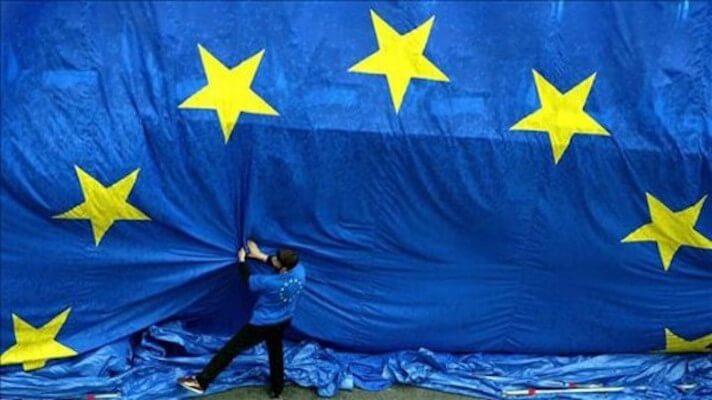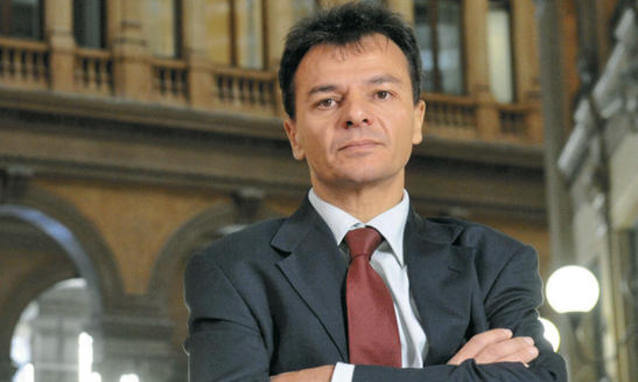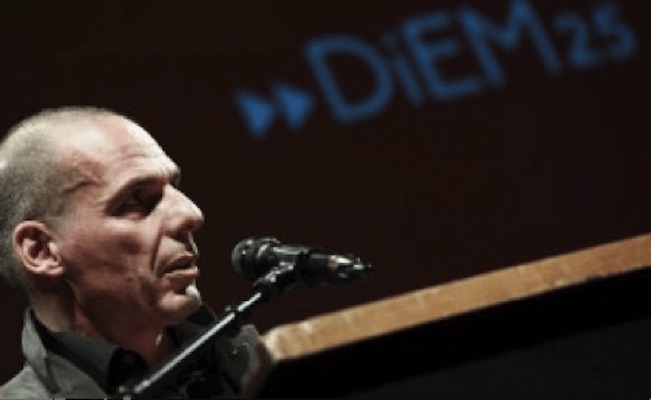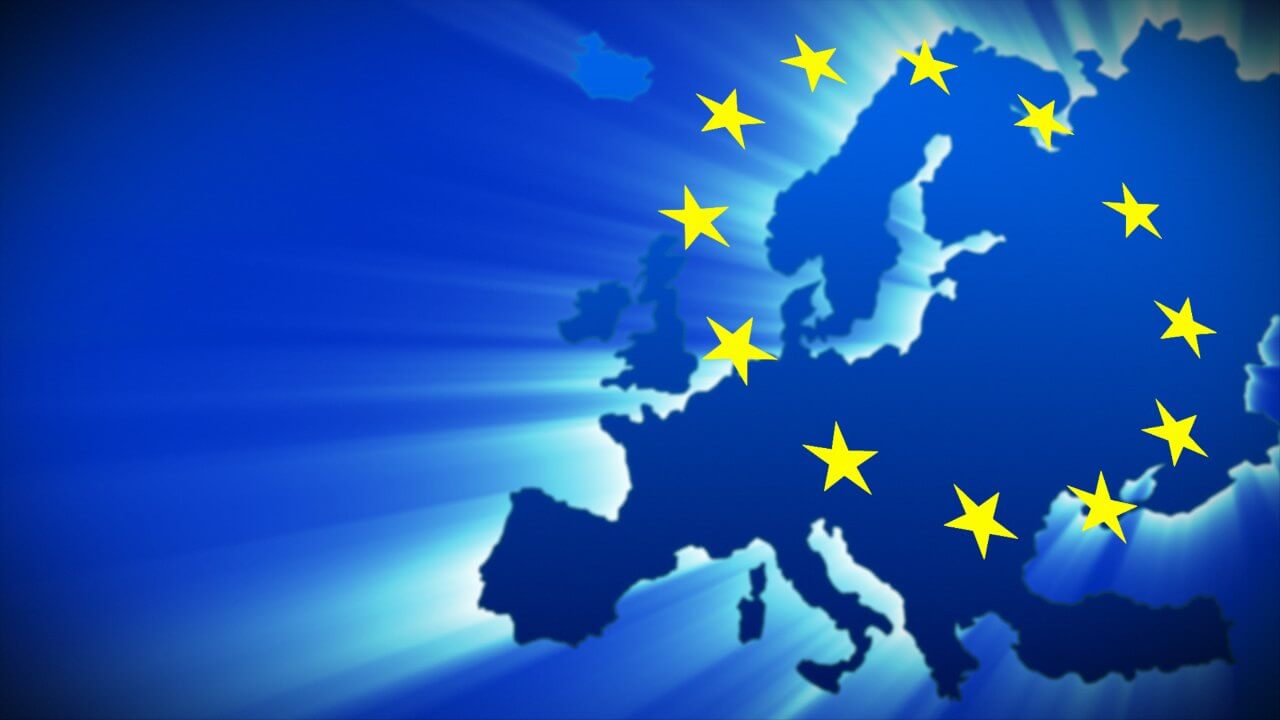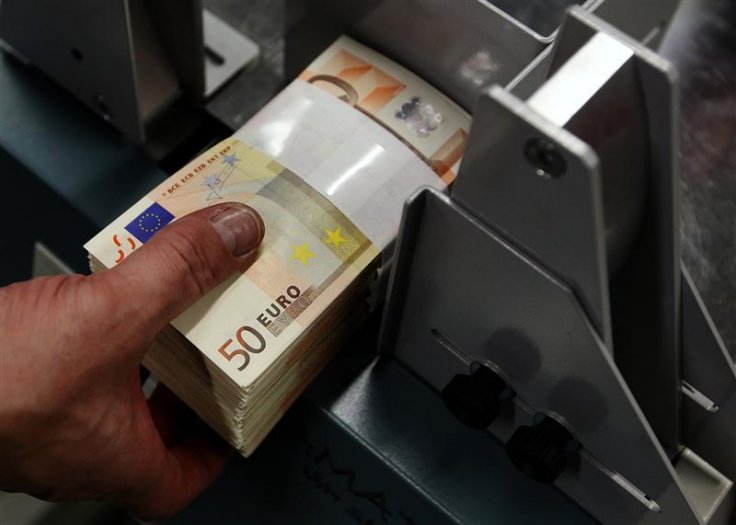by Gernot Bodner
No-Euro Forum in Italy to look for a common left exit strategy
The location of the third European No-Euro-Forum itself, Chianciano Terme in Tuscany, can be considered symbolic for the urgent need of an exit strategy to leave the corset of the currency union: during the 80ties it was a prosperous small town with it’s hot springs and hundreds of hotels where workers and pensioners spent their spa stays, financed from a growing economy and the social rights that were conquered. Today, 30 years after without investment, the infrastructure leaves a curious old-style-feeling (in modern terms „retro“) and it is largely empty. One and a half decades of economic recession, deconstruction of the welfare state and an increasing number of unemployed and precarious workers without access to social rights has left traces. The numerous congresses that gather in Chianciano since then, making use of its oversized and thus cheap hotels (e.g. in July it hosted the summer University of the European Left) cannot stop the slow ruin of the town. The big thermal spring was recently sold by one of the Italian crisis banks to a US-American investor.
The No-Euro Forum in Chianciano gathered left organizations from several European countries and the Ukraine under the common understanding of the need to break with the common currency. Beyond this common platform there was intensive discussion whether the Euro question can be separated from the EU project as a whole or not. In a panel on the economic crisis, the Italian economy professor from the Siena University, Ernesto Screpanti, insisted: changing the monetary politics with an exit from the Euro system and a return to the national currencies alone is not enough; what is needed is an active fiscal policy with strong state intervention and investments in the economy. The non-optimal currency area of the Euro cannot be separated from the radical market ideology that shapes all European treaties and its institutions.
The majority of participants in Chianciano came from the southern European periphery. Since the 2008 crisis, resulting in an accelerated economic decay, a deep social crisis and an experience of permanent austerity politics enforced via Brussels and Berlin, the consensus with European Union politics has fallen drastically in these countries. E.g. in Spain the positive opinion of its citizens on the EU has decreased from 85 % in 2007 to 51 % today, as reported by the economist Pedro Montes from the Initiative „Out of Euro” (Salir del Euro). This goes hand in hand with the rise of new opposition parties and also, since the Greek experience, with a step by step change of opinion towards the Euro question within some of the established parties.
Italy is probably the most outstanding example for these changes in the political landscape, facing a hardly sustainable economic and social crisis (banks, public debt, deindustrialization, unemployment) as well as a quick heading towards a political crisis of the regime. The Five Star Movement (Movimento 5 Stelle, M5S) could establish in this context as the party representing the discontent of the citizens. There is hardly anyone to deny that the M5S is the key for change in the country, and therefore, not surprisingly, it is the nightmare of the European elites. In spite of the various tendencies and the programmatic lack of definitions, M5S represents the rage against the national and European establishment, finding there also very clear-minded and left-wing speakers such as Marco Zanno, member of the European parliament for the M5S and one of the speakers in the opening of the Chianciano forum. He reported his direct experience with European politics, concluding that there is no chance for reform from inside. Thus any strengthening of democracy and social change in favour of the majority requires a break, returning to national sovereignty as a space for alternative development.
Chianciano showed interesting signs of renewal also within some of the traditional Italian left, facing the Renzi government as the last card of the Euro-Italian elites to play. This is not only symbolized by the PD dissidence of the “Italian Left” (Sinistra Italiana) around Stefano Fassina – participating in Chianciano with their leading member Alfredo D‘Attorre. Also inside other recent regroupings from the milieu of former Rifondazione Comunista such as the re-founded Communist Party of Italy (Partito Comunista Italiano) and others, there is increasing consensus that for Italy the fight against Euro and for reconquering democratic sovereignty rights is the lever for opposing the system. Also Alternativa per l‘ Italia, represented in Chianciano by Marco Mori, is such a group, heading more towards a position in the centre of the political spectrum. Currently many groups find themselves in a common, but still not fully united front for a No to Renzi’s constitutional reform that will be voted in a popular referendum in autumn. The Italian organizers of the Chianciano No-Euro-Forum themselves, the movement Programma 101, are a good example of the regrouping going on: they unify well known personalities from the academic milieu with political activists from the Italian radical left, frequently acting as a motor and linkage between the Italian left and the new upcoming and still amorphous popular discontent expressed by the 5 Stelle.
The Spanish delegation was a kind of mirror of the institutional crisis of the Iberian elites that has begun since Podemos entered the scene in 2014 stirring up the old two-party model. It is not surprising that also within the left the relations toPodemos are at the core of political debates. Manolo Monerero, MP of the electoral alliance between Podemos and Izquierda Unida (Unidos Podemos, UP) for Cordoba, represented those parts of the left in Chianciano that consider Podemosas the main lever for a new transition against the neoliberal bourbon republic of the Post-Franco era. But there are also other parts of the No-Euro movement, such as Diosdado Toledano, also a leading representative of Izquierda Unida in Catalonia, who are very critical against the common project with Podemos: they foresee a Syriza-like destiny when taking into account the very moderate face shown by Podemos since the elections of December 2015, particularly concerning their opposition against the European austerity course: Podemos has limited its demands to accepting a fiscal consolidation path that takes into account the most urgent social needs and goes hand in hand with economic growth. Still there seem to be some consensus – some with more, others with less optimism – that currently the chances for a break with the regime are still open and that Podemosis a key catalyser. In a theoretical debate Manolo Monereo (UP, Spain), Michèle Dessenne (PARDEM, France) und Carlo Formenti (University Lecce, Italy) discussed the question of populism and hegemony; a key issue in front of the social diversity of sectors affected by the crisis, the end of the formerly clear political-cultural distinction between labour and capital, as well as the shortcomings in classical Marxism to provide an up-to-date theory of transformation and socialist transition.
The conflict between the Greek Syriza government and the European institutions in the first half-year 2015 was and is a driving force for the upcoming left tendencies against the Euro in many countries. In Greece however it was not possible so far, in spite of the striking betrayal of Syriza, to build a new movement against the austerity memorandum with sufficient strength to bring the Syriza-ANEL coalition in straits. The most important intent, the Popular Unity (Laiki Enotita, LAE), was represented in Chianciano with Panagiotis Sotiris. Furthermore there were representatives of Antarsya that had not joint LAE as well as from the 2011 founded EPAM (Unified Popular Front). With Costas Lapavitsas one of the most prominent personalities among the Syriza left dissidents was present at the Chianciano Forum. As former MP of Syriza and founding member of LAE he was (and is) the most visible antipode to ex-minister of finances Varoufakis; Lapavitsas has demonstrated that a precondition for successful opposition against Brussels memorandum politics is political readiness and economic preparation to break with the Euro system. Today Lapavitsas is working for an all-European dialog forum among academics and activists within the European Research Network for Economic and Social Politics (EReNSEP) to prepare a programmatic and organisational alternative to the Euro system that proactively works to avoid repeating the Greek tragedy. Lapavitsas strongly insisted in the need to break with Euro and later on also with the EU. At the same time he called for a new design of European cooperation among sovereign states as opposed to nationalism. Lapavitsas, who works at the School of Oriental and African Studies (SOAS) of the University of London, also presented an analysis of Brexit showing that it is a sign of hope with big challenges involved: the lower classes begin to move politically without finding sufficient representation in an antagonistic force at the left. The contradictory and unexpected developments within the Labour Party with Jeremy Corbyn are, according to Lapavitsas, an expression of the new political dynamics with still open outcome.
A current moment of crisis for European politics being particularly dramatic in the Mediterranean countries is the question of migration. The Chianciano forum hosted a nuanced debate on this topic between Panagiotis Sotiris (LAE), Albert Reiterer (Euroexit), Leonidas Chryssanthopoulos (EPAM) and Marco Mori (Alternativa per l’Italia). The positions were located between the classical fight for unity among all oppressed in a common struggle for their unifying interests and equal rights on the one hand, and the need for regulating the labour market on the other hand, a necessity also for a movement/government that strives to break the free market logics. Still, there was a common understanding of solidarity, antiracism and anti-imperialism towards the Syrian and other refugees from countries suffering war and conflict – countries where in most cases the West is deeply involved as a key actor.
Another controversial discussion in Chianciano already showed up during the opening plenary and continued in different subsequent debates: the question of a positive reference to national sovereignty as perspective for emancipation facing the disintegration of EU. The discussion was centred on the question whether this perspective of national sovereignty has a left-wing connotation or it is beyond the traditional notion of left and right. The Greek EPAM as well as the French PARDEM (Parti de la Demondialisation) were of the latter opinion, while e.g. for the Greek LAE national sovereignty is strongly linked to the concept of popular sovereignty opening a socialist transition. The Italian Coordination of the Left against the Eurodefended an interpretation in analogy to the anti-fascist popular fronts: within a broad front, both in social and political terms and based on an integrative program and culture, there is still a continuing fight for hegemony between left and right orientations. Finally it is also necessary to take into account the concrete actors on the ground, beyond the theoretical considerations of actuality or not of the left-right dichotomy. In the field of opposition against Euro it is a matter of facts that there are also the right-wing populists, such as Front National in France, who in several countries represent the most visible opposition against Brussels and the national elites for an important section of the population, particularly in the north and central European centre. At this concrete level of political forces none of the organisations in Chianciano considered an alliance with right-wing populism and sovereignism neither possible nor desirable.
One remarkable point in the current political panorama is Germany, a country represented in Chianciano among others by MP Inge Höger (Die Linke), the economist Paul Steinhardt (Makroskop) and the long standing political activist Thomas Zmrzly (Eurexit). Paul Steinhardt analysed the deeply anti-keynesian ideology of the German elites as a background for their intransigence against giving up the idea of austerity as the main programme in front of the crisis, even at the risk to condemn the Euro to fail. Maybe it is this inflexibility of the German elites, openly visible to the public opinion during the negotiations with Greece, that explains the emergence of euro-critical and anti-euro tendencies from different sectors (e.g. ATTAC, Die Linke, several scientists) striving to come together in new coordination.
Finally it should be mentioned that there was a strong presence from Ukraine, with Alexej Albu (Borotba), Vasilji Volga (Union of Left Forces) and trade unionists from Odessa. In a situation of renewed aggression of the government against the Ukrainian opposition and, as always, with direct involvement of neo-Nazi forces at the forefront, Europe in no way corresponds to the self-proclaimed image of a peace project (see the resolution on www.ukraine-frieden.org). On the contrary, the hegemonic part of the EU establishment enforces the conflict side by side with the USA in a kind of cold-war-polarization against Russia that further fuels the Ukrainian conflict.
To resume, Chianciano has reflected an oppositional awaking in single EU countries as well as on the whole European level with new efforts towards better coordination. Taking into account the unresolved socio-economic crisis, the increasing tendencies towards EU-disintegration going along with authoritarian centralization of powers in Brussels and Berlin, the awaking of the left is coming quite late – even more when considering the advance of the right in many countries – and it is still programmatically in flux and organizationally disperse. However, the left anti-Euro opposition is more and more visible and its forces are clearly growing. In the current stage the main task is to find a minimum consensus among the different forces to bring them together in a broad debate, to become visible and to enable taking common action. Also in Chianciano the fight against the Euro has come out to best represent this minimum consensus within the diversity of thinking and specificity among countries. The conferences still scheduled for this year, in Copenhagen and Paris, confirm that finally something is moving at Europe’s left.
